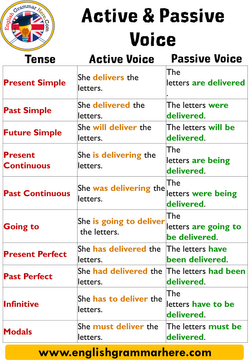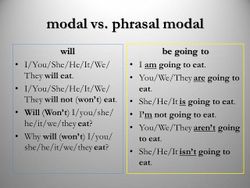Feb 23, 2022
Modal verbs

Modal verbs include: can, could, would, must, may, might, will, must, shall, should, ought to.
Modal verbs of ability
Can and could can be used to talk about ability
Example
- She can speak 4 languages
- I don't know where John is. He could've missed the train.
- This bill can't be right. $25 for two cups of coffee!
Modal verbs of obligation
Must or should to say something is necessary or unnecessary or to give advice
- children must do their homework
- We have to wear our uniforms at work
- You should stop smoking
Modal verbs of probability
Modal verbs of permission
Can and could and may to ask for and give permission. We can also use modal verbs to say something is not allowed.
- Could I leave early today please?
- You may not use the car tonight
- Can we swim in the lake?

Habits
Will and would can be used to talk about habits or things we did in the past
- When I lived in Italy we would often eat in the restaurant next to my flat
- John will always be late!
Could have, should have, would have
Could have + past participle means that something was possible in the past or you had an ability to do something in the past but you didn't do it.
I could have stayed up late but I decided to go to bed early.
Couldn't have + past participle means something wasn't possible in the past even if you wanted to do it.
He couldn't have passed the exam, even if he studied harder. (Very difficult exam)
Could have + past participle 2
We use this form when we want to make a guess about something that happened in the past. We don't know what we're saying is true or not.
Why is John late?
He could've got stuck in traffic
He could have overslept
Might have + past participle
He might have got stuck in traffic
Should have + past participle
It means something that would have been a good idea but you didn't do it. It's like giving advice about the past when you say it to someone else, or regretting what you did or didn't do when you're talking about yourself.
I should have studied harder!
Shouldn't have + past participle means something wasn't a good idea but you did it anyway.
I shouldn't have eaten so much cake!
We can also use should have + past participle to talk about something that if everything is normal and okay we think has happened. It is often used with by now because we are not sure everything is fine.
His plane should have arrived by now.
Would have + past participle
Part of the third conditional
If I had enough money, I would have bought a car.
Would and will can also be used to show if you want something, would have + past participle can be used to talk about something you wanted to do but didn't. We do not need an if clause.
I would have gone to the party, but I was very busy
I would have called you but I didn't know your number!